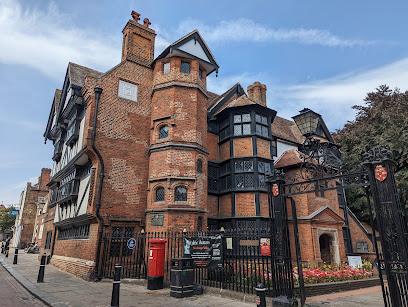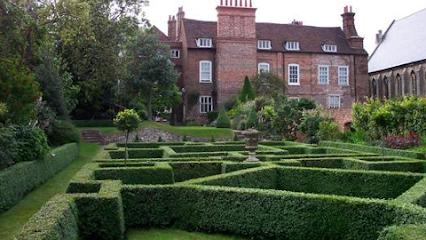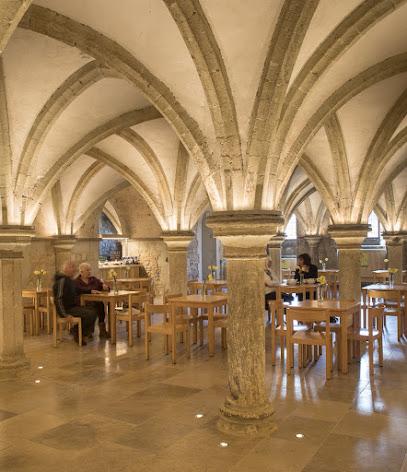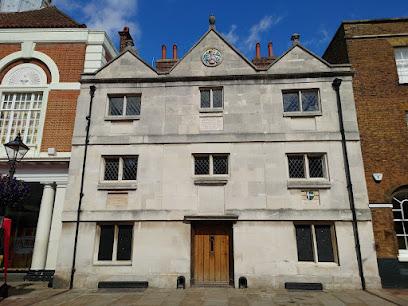Charles Dickens Rochester and Kent Day Tour
Highlights
- Visit the local Pub featured in Pickwick Papers
- Explore the New College of Cobham
- See the house where Charles Dickens lived and wrote
- Visit the church with graves that inspired Great Expectations
- Experience the historic city of Rochester and its Dickensian main street
-
Private transportation included
-
Duration 7 hours
-
Expert English guide
-
Suitable for all fitness levels
-
Visit Dickens' inspirations
Experience the world of Charles Dickens come to life on this captivating private tour of Rochester and Kent. Immerse yourself in the landscapes and locations that inspired some of Dickens' most beloved works, from the iconic Leather Bottle Inn featured in Pickwick Papers to the historic St Mary Magdalene Church and its fascinating history. Explore the house where Dickens lived and wrote, and visit the graveyard that served as the backdrop for the opening scenes of Great Expectations. Discover the charming city of Rochester, with its Dickensian main street and connections to the author's life and works. From the picturesque Eastgate House to the haunting Restoration House that inspired Miss Havisham's home, every step of this tour is a glimpse into Dickens' imagination and legacy. Don't miss the opportunity to be transported back in time and witness the world of Charles Dickens in person.
At a Glance
-
Free cancellation
-
7 hours
-
Available in English
-
Mobile voucher
-
Private Tour
-
Guided
-
Family friendly
Explore the life and inspirations of Charles Dickens on this immersive 7-hour private tour through Kent's most iconic literary landmarks.
Included
-
Private transportation
What to expect
The Leather Bottle Bar
The local Pub is called The Leather Bottle Inn. This is the Pub that is featured in Pickwick Papers and the pub where Dickens took his secret lovers!

The best kept secret in the County of Kent is next to the local Church, St Mary Magdalene; The New College of Cobham. It was built in 1360 to house the new priests who were studying there and were accommodated little cottages. However, in 1531 Henry VIII dissolved the Monasteries and the Monks were killed. The College remained empty for many years until Lord Cobham made them into Arms Houses, for the poor of the Parish of Cobham.
Gad's Hill Place
This was first seen by Dickens when walking with his father when he was a small boy. He announced to his Father that one day I will live here and he did! His study in the house and where he died remains as it was. Dickens built a wooden Swiss chalet in grounds over the main road from his house. This become his place of solace where he could write. He penned here Pickwick Papers, Great Expectations, A Tale of two Cities to name but a few. This house is currently a private school.
St James' Church Cooling
Built in the 1200s, it still has some original pews remaining which, Dickens would have most definitely used. The graveyard was where he based the opening scenes in Great Expectations, where Pip has his first encounter with Magwitch, who escaped from the prison ship taking prisoners to Australia. You can still see the Thames from here from the graveyard. Pip was laying some flowers at the grave of his Mother and his five brothers. In fact, there are Thirteen babies’ graves, these are from two families. They all died of marsh fever, now known as Malaria.
Rochester
We finish the tour visiting the wonderfully historic city of Rochester and its Dickensian main street full of connections to the life and works of Charles Dickens.

Dating from 1590, this townhouse was a family home, then a Boarding School and now a Museum. It features in his first and last novels. The house appears as Westgate house in The Pickwick Papers and as Miss Twinkletons Seminary for young ladies in The Mystery of Edwin Drood. At the back of the house in the gardens is Dickens, original Swiss Chalet, which has now been moved here from Gads Hill Place. Opposite Eastgate house is Mr Pumblechooks house featured in Great Expectations and The Mystery of Edwin Drood as the offices of Mr Sapsea, the Auctioneer. This building dates to 1694.

The home of Miss Havisham was based on this house. King Charles II stayed here in 1660 on his return from exile from France just before he was crowned King.
The Vines Park
This was the path that Pip took on his way to see Miss Havisham. And it was in this park that Dickens was seen leaning against a fence two days before he died. This park was formerly the vineyard of Rochester Cathedral and monasteries.

The Cathedral, which is the second oldest in the country and dates from 604, and it is mentioned several times in Dickens novels. His wish was to be buried here, but Queen Victoria thought it not fitting and insisted he should be buried in Westminster Abbey

The Castle was first built in 1127 by the Normans. There was a siege in 1215 by King John against the Barons of England who held it. Parts of the Castle were destroyed, but then was rebuilt by Henry III.
Guildhall Museum
People who have stayed here are, Ann of Cleves, Henry VIII 4th wife, Queen Mary, Henry VIII first daughter, King Philip of Spain and King Charles I.

In addition to his 15 full length novels, Dickens also wrote several short stories. One of these was The Seven Poor Travellers, in which Dickens himself, as narrator, become the seventh traveller. The house was founded by Richard Watts, MP for Rochester in 1563 as a charity for six poor travellers to receive a nights free lodging.
The experience can be subject to change due to bad weather or unforseen circumstances. We always endeavour to give you the best possible experience.
Additional Information
-
Public transportation options are available nearby
-
Suitable for all physical fitness levels
What our experts say
-
Try local delicacies at The Leather Bottle.
-
Visit Rochester Castle for stunning views.
-
Check out local shops on Rochester's main street.
-
Don't miss the gardens at Eastgate House.
-
Wear comfortable shoes for walking.
More About this Experience
Introduction
The Charles Dickens Rochester and Kent Day Tour offers a unique and immersive experience for literature enthusiasts and history buffs alike. This private tour takes you on a journey through the picturesque county of Kent, also known as "The Garden of England." Explore the locations that were central to the life of Charles Dickens, one of the greatest literary figures of all time.What to expect?
During this tour, you can expect to delve into the world of Charles Dickens and gain fascinating insights into his life and works. Visit the places that inspired some of his most beloved novels and short stories. Immerse yourself in the rich history and charming atmosphere of Rochester, where the author spent a significant portion of his life. Discover the iconic Six Poor Travellers House, a charitable institution mentioned in one of Dickens' captivating short stories.Who is this for?
This tour is perfect for literature lovers, history enthusiasts, and anyone seeking a truly immersive cultural experience. Whether you're a fan of Charles Dickens or simply curious about the Victorian era, this tour offers a captivating journey through the author's life and the settings that influenced his timeless works.Why book this?
Embark on this private tour to uncover the hidden gems of Kent and immerse yourself in the world of Charles Dickens. Be transported back in time as you explore the same streets and buildings that inspired the author's vivid imagination. With a knowledgeable guide, you'll gain a deeper understanding of Dickens' life and the social issues he addressed through his writing. This tour offers a unique opportunity to connect with the literary genius and the rich history of Kent.Good to know
During the tour, private transportation will be provided, ensuring a comfortable and convenient experience. Discover the quaint charm of Rochester and its historical significance, surrounded by stunning natural beauty. The tour is designed to be informative, engaging, and tailored to your interests, allowing you to make the most of your time exploring the birthplace of Charles Dickens.Reviews
Previous participants praise the Charles Dickens Rochester and Kent Day Tour for its insightful exploration of the author's life and the enchanting locations that inspired his stories. Travelers have expressed their satisfaction with the knowledgeable guides who bring Dickens' world to life, making the experience both educational and entertaining. Those who have embarked on this tour have not only deepened their appreciation for Dickens' literary genius but have also fallen in love with the picturesque landscapes and rich history of Kent.This is a popular product and the date you are looking for just sold out. Next available date is



















